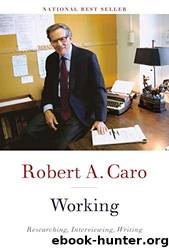Working: Researching, Interviewing, Writing by Caro Robert A

Author:Caro, Robert A. [Caro, Robert A.]
Language: eng
Format: epub
Tags: Writing, Biography, History, Politics
ISBN: 9780525656340
Amazon: 0525656340
Goodreads: 43205240
Publisher: Penguin Random House
Published: 2019-04-09T07:00:00+00:00
* * *
â
BEFORE THE CAMPAIGN was overâin that single month, October, 1940âLyndon Johnson had raised from Texas and had distributed to congressional candidates, campaign funds on a scale that dwarfed anything ever given to Democratic congressional candidates from a single, central source. The documents in those boxes of Johnson âHouse of Representatives Papersâ made that clear. And as I turned the pages in those boxes there were other documents. âGeneralâUnarrangedâ contained another list. There were two typed columns on each of its thirteen pages, typed by either John Connally or Walter Jenkins; each of these Johnson assistants was to tell me that he had been the one who had typed it. In the left-hand column were the districts of congressmen who had asked the Congressional Committee for money. In the second column were the names of the congressmen and the amount each had asked forâtiny amounts in the terms of later erasâand what, in the congressmanâs own telegraphed words, he needed it for. MUST HAVE $250 BY THURSDAY NIGHT FOR LAST ISSUE ADVERTISING, for example. Or $350 BY THURSDAY. HAVE SET UP MACHINERY TO REACH 11,000 ADDITIONAL VOTERS BY MAIL. Or COULD USE $500 FOR WORKERS IN SPANISH AND ITALIAN DISTRICTS. Or NEED $1,000 NOVEMBER 1ST TO HIRE POLL WATCHERS. Or CHANCES BRIGHTâ¦IF WE CAN GET RIGHT AWAY $14 FOR EACH OF FIVE COUNTY PAPERS AND $20 FOR TITUSVILLE HERALD.
And there was also a third column on the page, or, rather, handwritten notations in the left-hand margin, next to each district, notes dealing with each congressmanâs request. The handwriting in that column was Lyndon Johnsonâs. If he was arranging for the candidate to be given part or all of what he had asked for, Johnson wrote, âOKâ$500â or âOKâ$200â or whatever the amount he had decided to give. If he did not want the candidate to be given anything, he wrote âNone.â And, by some names, he wrote: âNoneâOut.â (What did âNoneâOutâ mean?, I was later to ask John Connally. âIt meant he [the candidate] was never going to get anything,â Connally said. âLyndon Johnson never forgot, and he never forgave.â)
Lyndon Johnson had identified a source of financing for congressional races across the United States, a source that had in the past been used principally on behalf of presidential or senatorial candidates, senatorial candidates mostly from Texas: Texas money. Using the power of House Speaker Sam Rayburn of Texas, he had made sure the money came only through him. When, in 1940, officials of the Democratic Congressional Campaign Committee had attempted to go around him directly to the source, writing directly to the oilmen to request contributions, the oilmen had asked Rayburn whom to send the money to, and the oilman had thereupon replied not to the committee but to Lyndon Johnson, writing, in the words of one of them, Charles Roeser, I HAVE DECIDED TO SEND MY CONTRIBUTIONâ¦TO YOUâ¦.I AMâ¦LEAVING IT UP TOâ¦YOU, TO DECIDE IN WHAT DISTRICTS THESE FUNDS CAN BE BEST USED. And Johnson was
Download
This site does not store any files on its server. We only index and link to content provided by other sites. Please contact the content providers to delete copyright contents if any and email us, we'll remove relevant links or contents immediately.
Hit Refresh by Satya Nadella(9132)
When Breath Becomes Air by Paul Kalanithi(8442)
The Girl Without a Voice by Casey Watson(7888)
A Court of Wings and Ruin by Sarah J. Maas(7843)
Do No Harm Stories of Life, Death and Brain Surgery by Henry Marsh(6941)
Shoe Dog by Phil Knight(5266)
The Rules Do Not Apply by Ariel Levy(4966)
A Higher Loyalty: Truth, Lies, and Leadership by James Comey(4959)
Hunger by Roxane Gay(4927)
Tuesdays with Morrie by Mitch Albom(4782)
Everything Happens for a Reason by Kate Bowler(4742)
The Immortal Life of Henrietta Lacks by Rebecca Skloot(4587)
Millionaire: The Philanderer, Gambler, and Duelist Who Invented Modern Finance by Janet Gleeson(4478)
How to Change Your Mind by Michael Pollan(4356)
All Creatures Great and Small by James Herriot(4319)
The Money Culture by Michael Lewis(4207)
Man and His Symbols by Carl Gustav Jung(4135)
Elon Musk by Ashlee Vance(4127)
Tokyo Vice: An American Reporter on the Police Beat in Japan by Jake Adelstein(3995)
